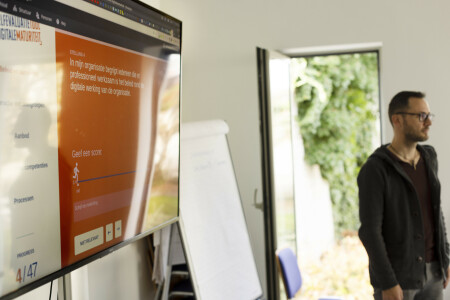Report: how digitally mature are Flemish cultural organisations?
27 Jan 2022In 2019, meemoo launched the Digital Maturity Self-Assessment Tool, requested by the Flemish Department of Culture, Youth and Media. This online tool helps organisations from the broader cultural field assess how digitally mature they are. Now, three years later, it’s high time for an analysis!
At www.digitalematuriteit.be, organisations can use 47 statements to find out how well they score in terms of digital maturity. They can then immediately compare their scores with other organisations in the sector, and pick up tips and tricks to improve it. Handy!
Many organisations have taken advantage of the tool since its launch, which you can even do anonymously. We save the overview of all this data at meemoo, and have conducted an extensive analysis based on the answers from organisations that completed the Self-Assessment Tool non-anonymously. Want to find out how digitally mature cultural organisations consider themselves to be?

Meemoo-colleague Bart Magnus during a guided filling out session of the tool.
A look at the numbers
Between January 2019 and December 2021, 52 organisations completed the tool non-anonymously. Four of them even did it twice. The average score is 57 out of 100.
Libraries and arts organisations score themselves considerably higher than other cultural heritage organisations. Organisations that manage collections score themselves on the low side. Interestingly: the smaller the organisation, the higher the score. Small organisations assess their own digital maturity as higher than average.
Strengths
We can deduce a great deal from the statement rankings and explanations that organisations give for their answers. Most organisations, for example, are currently focusing strongly on the following aspects:
visibility on their own online communication channels;
working digitally (no surprise in these times of working from home);
managing internal information and privacy.
Work to be done
The most important aspects are of course the points that require attention. We therefore look at the five lowest scoring statements in more detail here. Organisations can still make considerable gains in the following areas:
Statement 20. My organisation offers digital tools that enable our target audience to create digital content in a user-friendly way. The target groups participate digitally and become co-creators.
Online participation and co-creation with target audiences is not high on most organisations’ agendas. It’s an area that – at best – has only been used for experimenting with so far.
Statement 27. My organisation clearly states whether the online content that it makes available can be re-used, and under what conditions.
This confirms that many cultural organisations are still not paying sufficient attention to having correct information about re-usage conditions for their online content. The respondents indicate that this is often due to software limitations or a lack of knowledge about this topic. A wake-up call!
Statement 4. Everyone who works professionally in my organisation understands that there’s a digital operations policy.
Many organisations indicate that not everyone in their team is equally up to date with the digital policy, often with big differences within the organisation itself.
Statement 5. My organisation has an active digital storage strategy that is applied for the long-term storage and accessibility of important digital documents.
Internal document management is still in its infancy for many organisations. A number of respondents indicate that they work in an ad hoc way in this area, without a well-developed strategy. Others do have a plan, but fail to implement it.
Statement 12. My organisation has a good understanding of its target audience’s (changing) digital needs, wishes and requirements with regard to our core activities.
Some organisations are already working on their target audience’s needs, whereas others don’t have this sufficiently on their radar yet. External causes, such as coronavirus restrictions, are ensuring that this is being accelerated in some organisations.
Want to know how digitally mature your organisation is? Do the test (link in Dutch).
